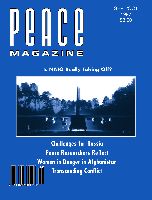
Peace Magazine Sep-Oct 1997, page 14. Some rights reserved.
Search for other articles by Lara Paul here
Last fall, the Taliban took over Kabul with "barely a shot fired," breaking many long months of war and constant shellfire for the city. The government, a more moderate party dominated by ethnic Tajiks (a northern minority) fled to the north where the fighting continues. The strict religious code of the Taliban is not such a shock to rural Afghans but in Kabul, a city that had enjoyed a relatively liberal lifestyle, it is a nightmare come true. Laughter, clapping and music have all been banned. Men complain about the decree that obliges them to grow full beards.
But this is a minor inconvenience compared to the hardships of women. In a city where women entered professions and rose to the top of the civil service, they may no longer do paid work. Where 70% of schoolteachers were women, girls may no longer attend school. They cannot leave their homes without the accompaniment of a close male relative, drive a car , or ride on public buses. If a woman does venture out into the streets, she must cover every inch of her body with a hot, uncomfortable burkha.
For many, the new rules are not just restrictive. They are life-threatening. No woman may seek medical treatment from a male physician. The international human rights organizations' classes on unexploded landmine and artillery shell identification are forbidden to women and girls, and they are the ones who perform most of the physical labor in the countryside and are therefore the most often exposed to these mines. The male-accompaniment rule confines an estimated 17,000 Kabuli widows to their homes. When approached regarding their plight, a Talib official responded, "Let them starve." Ironically, Mullah Mohammad Omar, leader of the Taliban, argues that he works on behalf of women and the poor. He first took up arms in 1994 to rescue two village girls who were being gang-raped by Mujahedeen ("holy warrior") fighters. The Taliban dismiss pressure to reform their policies as Western imperialism.
The Taliban, literally "students,"are mainly ethnic Pashtuns. The movement began in seminaries in refugee camps on the edge of Pakistan. The Koran has been interpreted variously by Muslims since the eighth century: the Talib version of Islam is extreme to say the least.The actual fighters are generally very young men with little education, and raised in a country traumatized by 18 years of civil war, during which women became the spoils for marauding forces. The Taliban rose quickly by defeating the Mujahedeen coalition that controlled the countryside. The Mujahedeen resort to piracy, rendering Afghanistan's roads virtually impassable. Through the imposition of order, the Taliban s won the favor of Pakistan's interior minister, Naseerullah Babar. It raised U.S. hopes for a gas pipeline through northern Afghanistan. Saudi Arabia, too, looked positively on the new force.
Moscow views the northwards expansion of this nationalist group as a security threat. Iran, dominated by Shia Muslims, is equally suspicious of the Sunni Taliban. All this boils down to an international hot spot, with women's suffering a low priority for almost everyone involved. Said U.N. envoy Mahmood Mestiri late last winter, "If I even mentioned women to the Taliban they would stop talking...I'll never do it." Indeed. As one woman put it, "Who are we that we are not worth the effort? What is the U.N. if it can ignore women?"
U.S. policy aims to work with the Taliban for women's rights. Anyone in her right mind knows that soft talk will have no effect whatsoever. The Taliban have met all foreign pleas for moderation with anger. In January, after radio broadcasts boasted that over 300 women had been beaten in a single day for dress-code violations, an Australian aid worker pleaded on behalf of the women. He was met with a shaking fist, told that he was not Muslim and that God would provide for the Taliban if foreign aid stopped. When Kabuli women marched in peaceful protest, Taliban fighters burned their leader alive in the street.
The fact that the Taliban government remains unrecognized by all members of the U.N. (save Pakistan) offers a ray of hope in an otherwise bleak situation.
This hope is made brighter by the work of a Canadian solidarity group, Women for Women in Afghanistan. Letter campaigns are underway and pressuring national governments and the U.N. to put Afghan women on the agenda. The group is fundraising for supplies and working to bring sustainable, income-generating projects to the thousands of women in refugee camps along Pakistan's border.
In October, a solidarity tour will bring prominent Canadian women to the camps and, if possible, to Kabul to show support and raise Canadian awareness. And we need our awareness raised. The Western media have been giving the Taliban mixed reviews over the past couple of years. Until the take-over of Kabul, it was mainly positive. Even after the repressive nature of Omar's brand of Islam came to light, one still finds articles that claim "most Kabulis would support the Taliban with strict Islamic rules if it brought peace and stability." I doubt that Afghan women were asked for their opinion. For them, there is no peace.
Lara Paul is a former Managing Editor of Peace. Women for Women in Afghanistan can be reached at P.O. Box 204, Dunnville, ON, N1A 2X5, tel: 905/774-8091 or 416/535-6586.

Peace Magazine Sep-Oct 1997, page 14. Some rights reserved.
Search for other articles by Lara Paul here